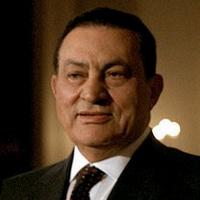Six months ago, Hosni Mubarak was the unchallenged ruler of Egypt, and his son Gamal was generally assumed to be the heir-apparent -- a modernizer and reformer waiting in the wings. Today, Mubarak père is detained in hospital, while Mubarak fils is prisoner No. 23 at Tora Farm, the country's most notorious prison.
The wheel of fortune has turned so dramatically for the Mubaraks, in part because the provisional military government found it necessary to mollify protesters -- who continue to challenge its reform bona fides -- by vigorously taking action against the ancien regime. Indeed, with the wheels of justice also beginning to turn, Mubarak may end up facing the ultimate sanction: Some officials have openly noted that the former president, if charged and convicted, could potentially face the death penalty.
A trial for Mubarak would convincingly demonstrate that no one in Egypt is above the law. On the other hand, death or imprisonment for the former president would make it that much more difficult to convince future Egyptian presidents to peacefully relinquish power -- with the risk that some might resort to violence to try to stay in office, as Laurent Gbagbo attempted in Ivory Coast. Moreover, Mubarak's uncertain fate is also complicating efforts to encourage entrenched autocrats in other parts of the world to peacefully step down. Mubarak's trajectory, from head of state to detainee in a military hospital, with his sons and his former associates all now "guests" in Egypt's most famous prison, provides little encouragement for leaders like Uzbekistan's President Islam Karimov or Belarus' President Alexander Lukashenko to follow a similar path.

